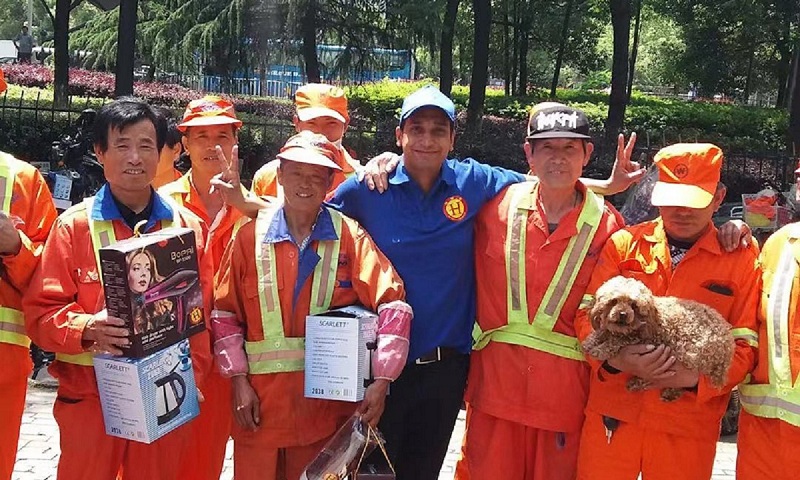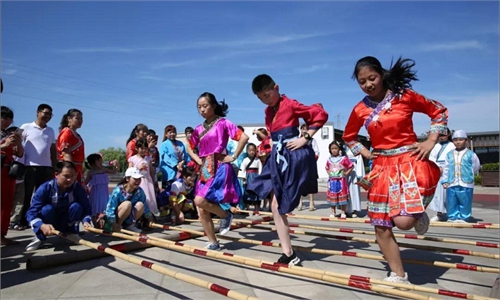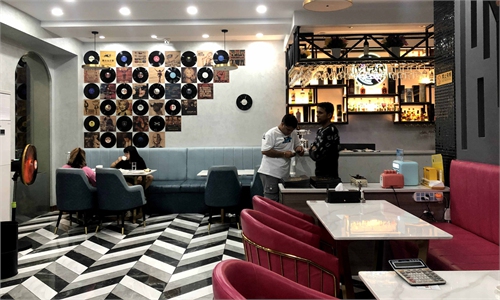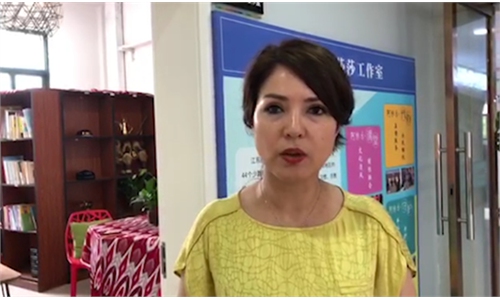
Sushil Agrawal poses for a photo with sanitation workers in Yiwu in 2015, when he joined a charity activity to send cooling products to those work in the summer heat. Photo: courtesy of Sushil Agrawal
The People's Mediation Committee for Foreign-related Disputes of Yiwu City in East China's Zhejiang, a mechanism set up with support from local justice authorities in 2013 to solve commercial disputes amid increasing foreign trade, has so far involved in a total of 18 foreign nationals in dispute mediation, an innovative effort to improve the local business environment.The overseas mediators in the committee, who engage on a voluntary basis, are from about 16 different countries and regions, including India, Nepal, Senegal and South Korea, the Global Times learned. Besides their language skills, they have clear advantages in mediation, as they not only have rich experience in foreign trade, but are also familiar with cultures and the general rules in business in China and their own countries and regions, according to Chen Jinyan, director of the committee.
"This mechanism ensures any disputes in foreign trade can be solved in a fair and equal manner," Chen said, noting that the committee handles disputes in accordance with the law and principles and on a voluntary basis of related parties.
Compared with taking disputes to court, such mediation is more efficient and reduces costs. So far, over 1,000 overseas-related disputes involving more than 110 million yuan ($17.13 million) have been resolved by the committee.
"People who have been through lawsuits will understand the value of mediation," Nepalese national Sushil Agrawal told the Global Times. He said that mediation can usually be done within three hours, but if an issue is complicated or suspicious, it would take more time.
Agrawal settled in Yiwu in 2002 and is a veteran mediator with six years of service. So far, he has solved nearly 80 registered cases and another 80 unregistered cases with very quick negotiation over the phone or face to face.
Agrawal has his rules to ensure a clear vision while dealing with complicated disputes and remain fair in mediation. "The most important thing is to keep the balance between entering somebody's shoes to understand their point of view and to come back with full consciousness and deal with complete honesty and integrity," he said.
In some cases, moral values and ethics have to be expressed to untie these knots, he noted.
Such mediation experiences have benefited the foreign mediators a lot in turn, some of them told the Global Times.
Khadka Raj Kuma, a Nepalese national who has been living in Yiwu for nine years and been a mediator for one year, said that through the experiences of solving different kinds of disputes, he has learned more about the local regulations and laws on business and people's different mindsets in running businesses, which in turn helps him to run his own business better.
Having trade exchanges with 233 countries and regions, Yiwu receives over 560,000 passenger trips from overseas every year. It is also home to more than 15,000 overseas merchants from over 100 countries and regions.
Thanks to its open and diverse cultural atmosphere, many expatriates in Yiwu actively engage in local affairs, as a way to integrate local culture and life.
Since 2014, Gholamhossein Dehghani, a 54-year-old Iranian businessman, has been a Laoniangjiu, an honorific title for an individual who is often invited as a mediator due to their prestige and fairness, in Yiwu's Jimingshan community, a multicultural community where there are around 1,400 foreign nationals from 74 countries and regions.
A multi-lingual speaker, Dehghani has helped resolve various disputes, from neighborhood frictions to business disputes, among people from different countries in the community.
Before 2014, most of the disputes were caused by misunderstandings due to language and communication problems, and such situations have improved after the local authorities started a language training program where foreign nationals can learn Putonghua for free, according to Dehghani.
Dehghani has been living in Yiwu for about 16 years. He also regularly volunteers to participate in other community affairs including security patrol, fire safety supervision, and making proposals to local authorities on city reforms.
"The sense of security, tolerance and passion that I have in Yiwu has made me regard Yiwu as my home and I therefore feel obliged to do something for the city," he said.



